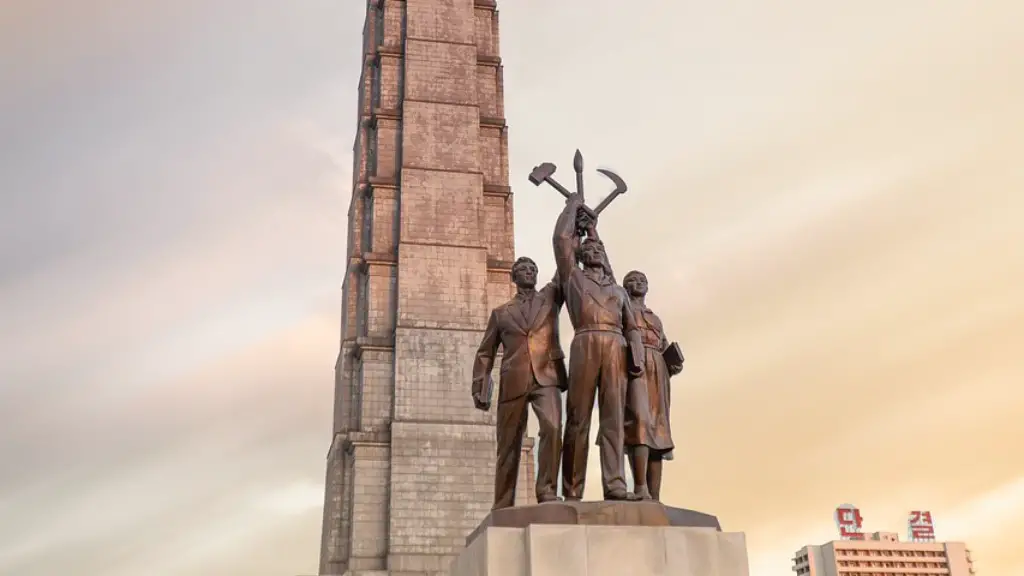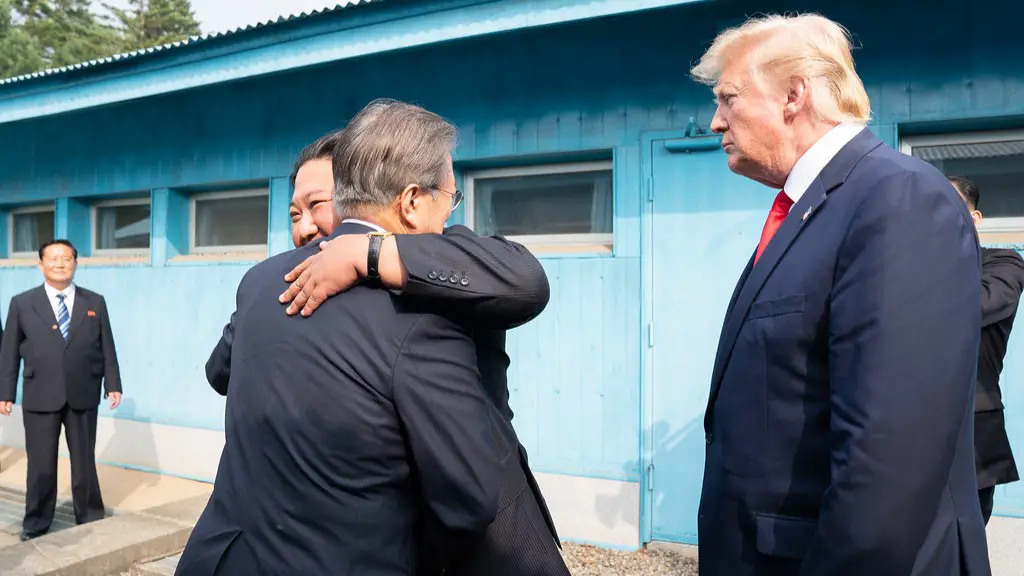Conflict of Interest and Ideology
North Korea is an authoritarian state with a political system which maintains an iron grip on its citizens. This unilateral approach to governance has, for over six decades, been held up by a totalitarian and oppressive regime under the rule of the Kim family dynasty. It is unclear why the authorities in Pyongyang have resorted to such an uncompromising stance, but fear and oppression of the population have been major components of their rule. This harsh political atmosphere has led many to question whether North Korea will ever be free.
On a structural level, the North Korean government has multiple layers of security filled with additional institutional checkpoints, censorship, and surveillance. All of this contributes to the difficulty of overthrowing the current regime. This leaves the possibility of North Korea being free in an ideological sense, instead of through the direct overthrow of the current power structure.
In a historical context, North Korea has only recently begun to open up to dialogue. In early 2019, North and South Korea agreed to meet in an attempt to peacefully unite the peninsula. Even though progress has been made, opinion is still divided on whether or not the threats of conflict posed by North Korea have been fully addressed. The external political context further complicates matters, as the nation has been facing sanctions from the United Nations since 2006.
The international community is split amongst those who believe the situation can be resolved through dialogue, and those who believe that stronger coercive measures should be taken in order to bring about regime change. While the US government tends to take a hardline approach, other nations argue for multi-lateral diplomacy which would involve China and Russia in this discussion.
On one hand, proponents of dialogue point to the fact that North Korea is a closed society, where Western influences are met with suspicion and hostility. Despite this, North Koreans are very much exposed to the outside world. Proponents of dialogue further argue that there could be an opportunity to use this information to bring change from within.
On the other hand, those who oppose this view argue that in a totalitarian regime, there is no possibility for real and lasting change without outside intervention. Opponents of dialogue suggest that the only way to achieve this would be through the use of economic, political, and military measures. This approach is more likely to lead to instability, furthering the risk of a military conflict in the region.
Impact of Sanctions
The current economic sanctions have had a powerful effect on North Korea’s economy, putting immense pressure on the government. This has caused severe economic hardship for ordinary citizens and has contributed to an already difficult situation.
The economic sanctions have been taking a toll on the nation’s infrastructure, as it is no longer able to import the necessary materials for long-term investment. At the same time, the increasing restrictions have hindered the country’s international trade and have made it difficult for North Korea to engage in business with the outside world.
Furthermore, the implementation of the U.N. Security Council’s resolution 2397 in 2017, which focused on North Korea’s oil imports, met a strong response from Pyongyang. This led to North Korea suspending its communications with other countries, increasing the tensions between these nations.
Nevertheless, while sanctions are intended to pressure North Korea, the reality is much more complex. Sanctions are not a one-size-fits-all solution, and the simple truth is that North Korea is immune to most financial restrictions due to its heavily militarized and authoritarian approach to governance. As a result, it has become increasingly apparent that sanctions are not likely to have a direct impact on the regime’s behavior or attitude.
Strategic Maneuvering
In the face of international pressure, the North Korean government has resorted to a strategy of brinkmanship, escalating tensions and making threats in order to gain leverage in negotiations. This form of strategic maneuvering has been a cornerstone of the Kim dynasty since it came to power and is intended to prevent any form of external interference by presenting the outside world with an uncompromising attitude.
In recent months, tensions between North and South Korea have started to reduce as both parties have shown a willingness to engage in dialogue. This has caused many to raise hopes that the situation can be resolved peacefully, but such optimism should be tempered by the reality that North Korea is still a very closed and isolated nation.
Although North Korea has made steps towards engaging with the world, experts suggest that the nature of this engagement has been strategic rather than sincere. It is widely believed that Pyongyang is still attempting to manipulate the situation to its advantage, and is likely to continue such tactics as negotiations progress.
Cultural Preservation
A crucial yet often overlooked aspect of the North Korean situation is the country’s culture. North Korea’s culture has been distorted and threatened by the regime’s oppressive control over its people and its refusal to embrace freedoms like those enjoyed in the West.
Moreover, North Korea’s culture is largely cut off from the outside world as it is so heavily controlled by the government to retain its oppressive atmosphere. This is seen in the nation’s heavily censored media and the self-reliance ideology of Juche – the North Korean national ideology. Although North Koreans are exposed to the outside world through smuggled materials, this is not enough to completely alter the country’s culture.
The importance of preserving the distinct culture of North Korea is reflected in the nation’s insistence on its own greatness. For its people, even under the most oppressive of regimes, maintaining the unique identity of North Korea is a source of national pride. As such, any attempt to free North Korea must take into account the nation’s culture, with the intention of maintaining it, as opposed to dismissing it altogether.
Role of Diplomacy
In light of the complexity surrounding the situation in North Korea, the role of diplomacy is essential. International diplomatic relations, though at times tenuous, are seen as the key route towards ending the Koreas’ division and tension and developments in this area have been viewed as signs of reform and growth.
The two recent summits between North and South Korea have been hailed by many as a major step in this direction. North Korea’s agreement to stop nuclear and missile tests and dismantle certain nuclear facilities has been considered a positive move. However, international experts still remain cautious, believing sustainable change is unlikely unless there is more comprehensive reform and a commitment to open dialogue between the nations involved.
Progress has also been seen between the US and North Korea. In 2018, President Trump and Kim Jong-un met in a historic summit in Singapore, which was seen to have opened the path for negotiations. Both sides have made progress in their talks, but objectives have yet to be reached and tensions remain high.
Domestic Policy
The dictatorship in North Korea has consistently been a major hurdle in the process of freeing the nation. Since the Kim dynasty took power, the nation has been tightly controlled with citizens witnessing little freedom under their rule. This makes it very difficult to envisage the potential of an uprising against the regime, considering the oppressive environment it has fostered.
Domestically, North Korea’s government has employed a series of oppressive tactics to maintain control. This has included restricting access to the internet, denying media freedom and censoring news and restricting the right to speech. All of this has resulted in limited public discourse on issues relating to North Korea, making it difficult for citizens to challenge the regime’s ideology.
Moreover, the North Korean government has been known to resort to human rights abuses in order to suppress popular dissent and remain in power. These systemic violations of international law have been widely documented and include torture, cruel and inhuman treatment, arbitrary detention and forced labor.
The combination of these factors has resulted in a society where the citizens have little control over their lives and little ability to challenge the government. This makes the prospect of North Korea being free a remote one, both domestically and internationally.
Role of the Military
The role of the military in a state like North Korea is of vital importance. The military has long been a bastion of power for the nation, with the Kim family relying on it for the maintenance of their power.
Under the Kim dynasty, the North Korean military has seen a significant boost in its resources, making it one of the world’s most formidable militaries. This has resulted in the country having a significant nuclear capability when coupled with its vast stockpile of conventional weapons.
As a result, the North Korean military has been viewed as a major obstacle to any hopes of freedom in the country. The emergence of a unified and independent North Korea is viewed by the government as something that would lead to its demise. Therefore, the military is likely to be a major actor if North Korea were ever to experience true freedom.
Religious Influence
The issue of religion in North Korea is another aspect of the country which has immense implications for its potential for freedom. Since the beginning of the Kim dynasty’s rule in 1948, religion has become increasingly suppressed and controlled by the government.
Under the rule of the Kim family, the country has seen the banishment of Christianity and the introduction of the official religion of Juche which is heavily infused with Stalinist ideology. As a result, North Koreans have grown up in an environment where their freedom of religious belief is heavily curtailed.
The state’s stance on religion has sometimes been surprising, with occasional attempts to engage with other faiths. The government even released a statement in 2018 that it supported improved ties with the Vatican, something which would have been unthinkable in the decades prior.
Despite these developments, religious expression is still tightly controlled and those who choose to worship outside the state religion face repression. As long as the current regime is in power, it is likely that religious expression in North Korea will remain severely curtailed and this could impede any attempts at freeing the nation.
Conclusion of Opinion
The situation in North Korea is incredibly complex and challenging. Taking into consideration the multitude of forces at play, it is difficult to answer whether the country will ever be free.
In order for North Korea to achieve true freedom, a multitude of issues would need to be addressed, such as humanitarian and economic obstacles, the effects of sanctions, the regime’s strategic calculations and the impact of culture and religion. This would require a comprehensive and multi-lateral approach which would involve both external and internal agents, as well as domestic and international bodies.
However, no matter how complex the situation is, the prospect of North Korean freedom should not be dismissed. The hope for such a scenario is still alive, and can only be achieved if the nation is given the resources and support it needs to move forward.


